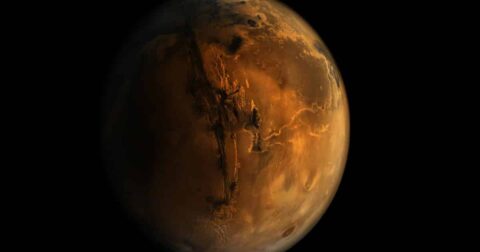News
Cows Can Use Tools. Are We Underestimating How Smart They Are?
Animal Behavior•5 min read
Perspective
Mars gives us a chance to start over and leave many of Earth's worst practices behind. While it sounds far-fetched, life on the red planet will almost certainly be free of animal suffering.


Words by Markos Hasiotis
The food system we have created on Earth is a mess. The exploitation of animals, unequal access to healthy foods, and needless wastage are just some of the problems which are at unacceptable and unsustainable levels. While it is vital that we clean that mess and improve our system, the (increasingly realistic) prospect of living on Mars affords humanity a meaningful opportunity: To establish a food system that is humane, fair, and sustainable from the get-go.
Several space experts and organizations have proposed their visions of what a food system on Mars might look like. It’s reassuring to see that many of the issues within Earth’s food system won’t be making the journey.
“A food system on Mars has to be more humane. It’s not practical to bring animal husbandry with us, but more importantly, it’s not ethical,” says planetary geologist Dr. Kevin Cannon, co-author of the seminal paper, Feeding One Million People on Mars. “Mars gives us a chance to start over, in a sense, and leave behind the worst practices here on Earth.”
Cannon envisions the Martian diet as being primarily plant-based. A lot of the plants consumed would be Earthly crops that are able to be grown on Mars. The initial method of growing these crops will most likely be hydroponics, as is the prediction of Cannon, Elon Musk, and researchers at Japan’s Institute of Space and Astronautical Science. Hydroponics is essentially where plants are grown inside a controlled environment, using water instead of soil. (Thankfully, water is able to be extracted from the surface of Mars).
Hydroponics are a proven means of producing edible greenery in inhospitable environments. A hydroponic system in Antarctica, EDEN ISS, was able to generate 590 pounds (268kg) of quality food, feeding a crew of six for one year. Hydroponics would also help minimize waste: The system greatly conserves water and would protect crops from storms, radiation, and other Martian phenomena, thus minimizing spoilage.
For those who still want to enjoy a meat dish on the Red Planet, Cannon predicts a range of insect meats, algae-based “meat,” and cultured meat products (made using animal cells) will be available. This will satisfy any desire for animal products without having billions of sentient creatures harmed and killed every day to produce them. An absence of animal agriculture will also spare the people on Mars from the resulting environmental damage as well as the spread of zoonotic diseases which can pass between animals and humans, like COVID-19. Imagine, a future with no pandemics!
There’s even the possibility of making food out of thin air. The European Space Agency has collaborated with startup Solar Foods to develop technology capable of producing edible protein out of nothing but carbon dioxide, water, electricity, and a small number of trace elements. Innovation will truly be on the menu on Mars and, thankfully, animal abuse won’t be.
A food system on Mars would need to ensure a sufficient quantity of nutritious food for all people because spending extended time in space can result in nutrient deficiencies. It will also be a crucial part of maintaining the psychological and physiological health of Martians. History shows us why: insufficient nutrition has derailed many exploration missions in the past.
Building a brand new food system means that it can be deliberately designed around the equitable distribution of nourishment rather than being focused on profit, as is the case on Earth. It’s because of this greedy system that nutritious food has sadly become overpriced and inaccessible for billions of people around the world. As Cannon rightly points out, “more equitable or post-scarcity communities should be the goal”. On Mars, it can be a key priority.
Mars does not have an abundance of resources to use for food production, nor can Martians rely on supplies being delivered from Earth (they would take seven months to arrive). Therefore, a Mars food system will need a robust and innovative means of conserving and recycling resources. “Waste won’t be an option,” Cannon says.
Cannon’s vision, as outlined in the paper he authored with Dr. Daniel Britt, is one of a “connected ecological system.” Where food waste is fed to insects, biosolids are used to fertilize plants, plants remove carbon dioxide from the air, excess plant products are converted into building material, and so on. It’s encouraging to see that the American, Japanese, and European space programs understand the importance of such waste minimization and have factored it into their Mars planning.
Even as the amount of resources on Mars grows, it is important that this thrifty and renewable system remains. Martian society must avoid descending into the wastefulness we currently see on Earth, where over one billion tons of food is wasted every year.
The hardest thing about fixing the food system on Earth is having to alter and dismantle massive structures and industries that have been entrenched for many decades. Mars would give us a red and dusty blank canvas on which to create an entirely new food system, one that is fuelled by innovation and sustainability as opposed to destruction and exploitation. It will be a difficult endeavor but also an excellent opportunity for humanity.
A fair, healthy, and sustainable food system on Mars would secure our future on a new planet while the knowledge and technologies we develop in the process can help us to repair the one on our home planet. Because if humans cannot learn to eat and live without causing harm to the world around us then, soon, we’ll have no home anywhere.